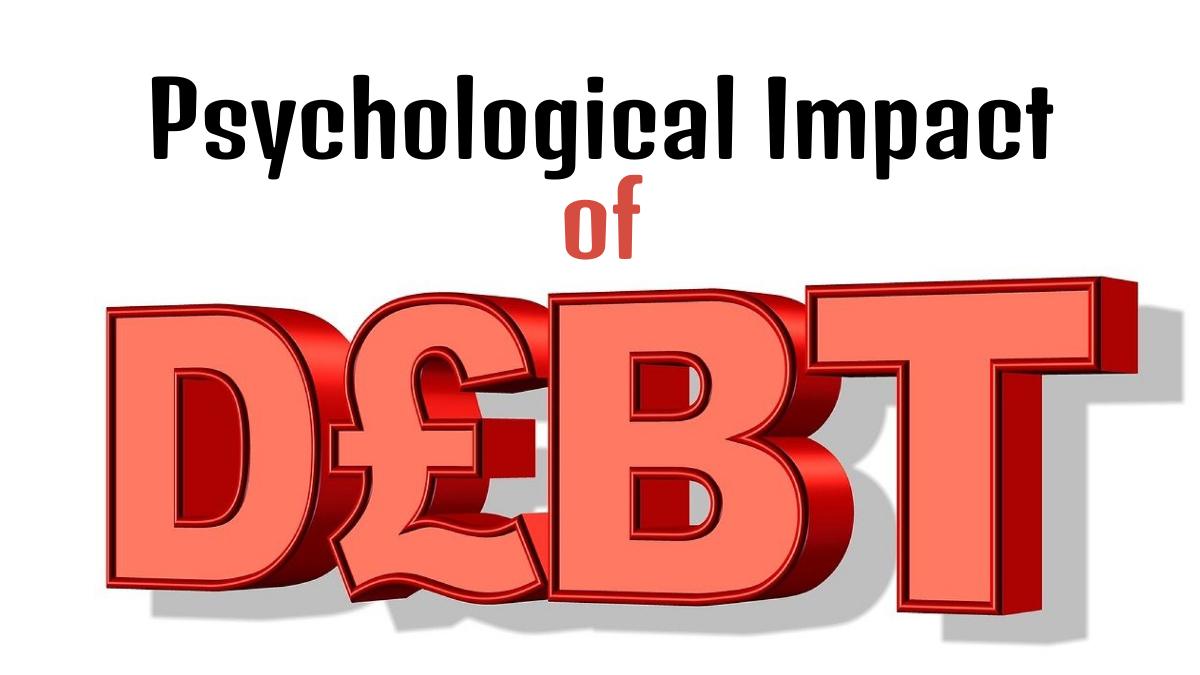Table of Contents
Debt is often perceived solely in terms of financial obligations, but its impact extends far beyond our bank accounts. It get into our thoughts, emotions, and relationships, leaving lasting imprints on our psychological well-being. In this blog, we embark on an exploration of the intricate relationship between debt and psychology, uncovering how it influences our stress levels, self-esteem, decision-making processes, and overall mental health. By breaking down these twisted connections, we want to show how debt affects us in many ways and give ideas on how to handle its impact on our lives.
“The weight of debt is not just measured in dollars and cents; it’s the invisible burden that steals our peace of mind and robs us of our joy.”
The Stress of Debt
Imagine waking up each morning with a weight pressing down on your chest, a constant reminder of the financial obligations hanging over your head. This is the reality for many individuals grappling with debt. The relentless worry about meeting financial obligations, ensuring bills are paid on time, and avoiding potential financial pitfalls can lead to overwhelming stress and anxiety. These concerns often infiltrate every aspect of daily life, overshadowing moments of joy and relaxation.
Sleepless nights are a common occurrence for those burdened by debt-related stress. The mind races with thoughts of impending deadlines, dwindling savings, and uncertain futures. This chronic state of unease not only takes a toll on mental well-being but also manifests physically, contributing to headaches, muscle tension, and fatigue.
Self-Esteem and Worth
Our financial situation has a profound impact on how we perceive ourselves. When faced with mounting debt, feelings of shame, guilt, and inadequacy can quickly set in, eroding our self-esteem. We may internalize societal judgments about financial success and failure, believing that our worth as individuals is intrinsically tied to our monetary status.
In the face of debt, we may find ourselves engaging in self-criticism and comparison, measuring our worth against arbitrary standards of material wealth. The inability to meet financial expectations can exacerbate feelings of inadequacy, leading to a downward spiral of negative self-perception.
These feelings of worthlessness can permeate various aspects of our lives, affecting our confidence in the workplace, our ability to form meaningful relationships, and our sense of belonging within our communities. The stigma surrounding debt can further compound these emotions, leaving individuals feeling isolated and misunderstood.
Decision-Making Under Pressure
When individuals are under the weight of debt, their decision-making abilities can be significantly impaired. The pressure to alleviate financial strain often leads to short-sighted choices that prioritize immediate relief over long-term stability. This is because debt creates a sense of urgency and desperation, driving individuals to seek quick fixes rather than sustainable solutions.
For example, someone struggling with debt may resort to borrowing more money or taking out high-interest loans to cover existing obligations or maintain their standard of living. While this may provide temporary relief, it ultimately deepens the cycle of debt, making it even harder to break free from its grip in the future. By focusing on short-term solutions, individuals may inadvertently worsen their financial situation, setting themselves up for further stress and hardship down the line.
Behavioural Patterns and Coping Mechanisms
Chronic debt can also reinforce negative behavioural patterns and coping mechanisms that exacerbate financial difficulties. When faced with overwhelming stress, individuals may turn to maladaptive coping strategies such as compulsive spending, gambling, or substance abuse to numb their emotions or escape reality temporarily. These behaviours offer temporary relief from the psychological burden of debt but often lead to further financial strain and exacerbate the cycle of debt.
For instance, someone may engage in compulsive shopping as a way to distract themselves from their financial worries or boost their mood temporarily. However, this behaviour only adds to their debt load, worsening their financial situation in the long run. Similarly, individuals may turn to gambling in the hopes of a quick windfall to alleviate their financial struggles, but more often than not, it only leads to greater losses and deeper debt.
Moreover, some individuals may withdraw from social interactions or isolate themselves as a coping mechanism for dealing with debt-related stress. Feelings of shame, embarrassment, and inadequacy may prevent them from seeking help or support from friends and family, further exacerbating feelings of loneliness and isolation.
Impact on Relationships
Debt doesn’t just affect individuals; it can also strain relationships with family, friends, and romantic partners. Financial disagreements and tensions over money management can lead to conflicts, arguments, and resentment within relationships. For example, disagreements about spending habits, budgeting, or prioritizing financial goals can create friction and strain trust between partners.
Moreover, individuals may feel ashamed or embarrassed to discuss their financial struggles with loved ones, fearing judgment or rejection. This reluctance to communicate openly about financial issues can lead to feelings of isolation and loneliness, further deteriorating relationships. In some cases, individuals may even hide their debt from their partners or family members, leading to a breakdown in trust and intimacy.
Regaining Control and Seeking Support

“Rather go to bed without dinner than to rise in debt.” – Benjamin Franklin
When faced with debt, it’s easy to feel overwhelmed and powerless. However, regaining control over our financial lives is crucial for mitigating the psychological impact of debt. This process involves taking proactive steps to manage our finances effectively and seeking support from various sources.
- Budgeting: One of the first steps in regaining control is creating a budget. A budget helps us understand our income, expenses, and debt obligations. By tracking our spending and prioritizing essential expenses, we can develop a plan to pay off debt and manage our finances more responsibly.
- Seeking Financial Advice: Consulting with a financial advisor or counsellor can provide valuable insights and guidance. These professionals can offer personalized strategies for managing debt, improving credit scores, and planning for the future. They can also help us explore debt relief options, such as debt consolidation or negotiation with creditors.
- Exploring Debt Relief Options: Debt relief programs and services can offer assistance to individuals struggling with debt. These options may include debt consolidation loans, debt management plans, or debt settlement programs. It’s essential to research these options carefully and choose the one that best fits our financial situation and goals.
- Seeking Emotional Support: Dealing with debt can take a toll on our emotional well-being. That’s why reaching out to friends, family, or support groups is essential. Sharing our struggles with trusted individuals can provide emotional support, encouragement, and perspective. Knowing that we’re not alone in our challenges can help alleviate feelings of isolation and shame.
The Mental Health Toll
The impact of debt on mental health is significant and far-reaching. Persistent financial stressors can worsen existing mental health issues and contribute to the development of new ones. Understanding the signs of distress and seeking professional help are crucial steps in addressing the mental health toll of debt.
- Recognizing Signs of Distress: It’s essential to pay attention to how debt is affecting our mental health. Symptoms of distress may include persistent feelings of sadness or anxiety, changes in sleep or appetite, difficulty concentrating, and withdrawal from activities or social interactions. Recognizing these signs allows us to take proactive steps to address our mental well-being.
- Seeking Professional Help: When debt-related stressors become overwhelming, seeking professional help is crucial. Therapists, counsellors, and mental health professionals can offer support, guidance, and coping strategies for managing debt-related challenges. They can also help us develop healthy coping mechanisms and improve overall well-being.
- Utilizing Support Services: Many communities offer support services for individuals struggling with debt and mental health issues. These may include helplines, support groups, and community-based organizations. These resources can provide a safe space to share experiences, seek advice, and connect with others facing similar challenges.
Conclusion
Debt is more than just a financial burden; it’s a psychological challenge that impacts every aspect of our lives. By understanding the psychological impact of debt and taking proactive steps to manage our finances and prioritize our mental health, we can regain control and work towards a brighter future. Seeking support from friends, family, professionals, and community resources is essential in navigating the challenges of debt and protecting our well-being. With perseverance, resilience, and self-care, we can overcome the weight of debt and build a more secure and fulfilling life.















